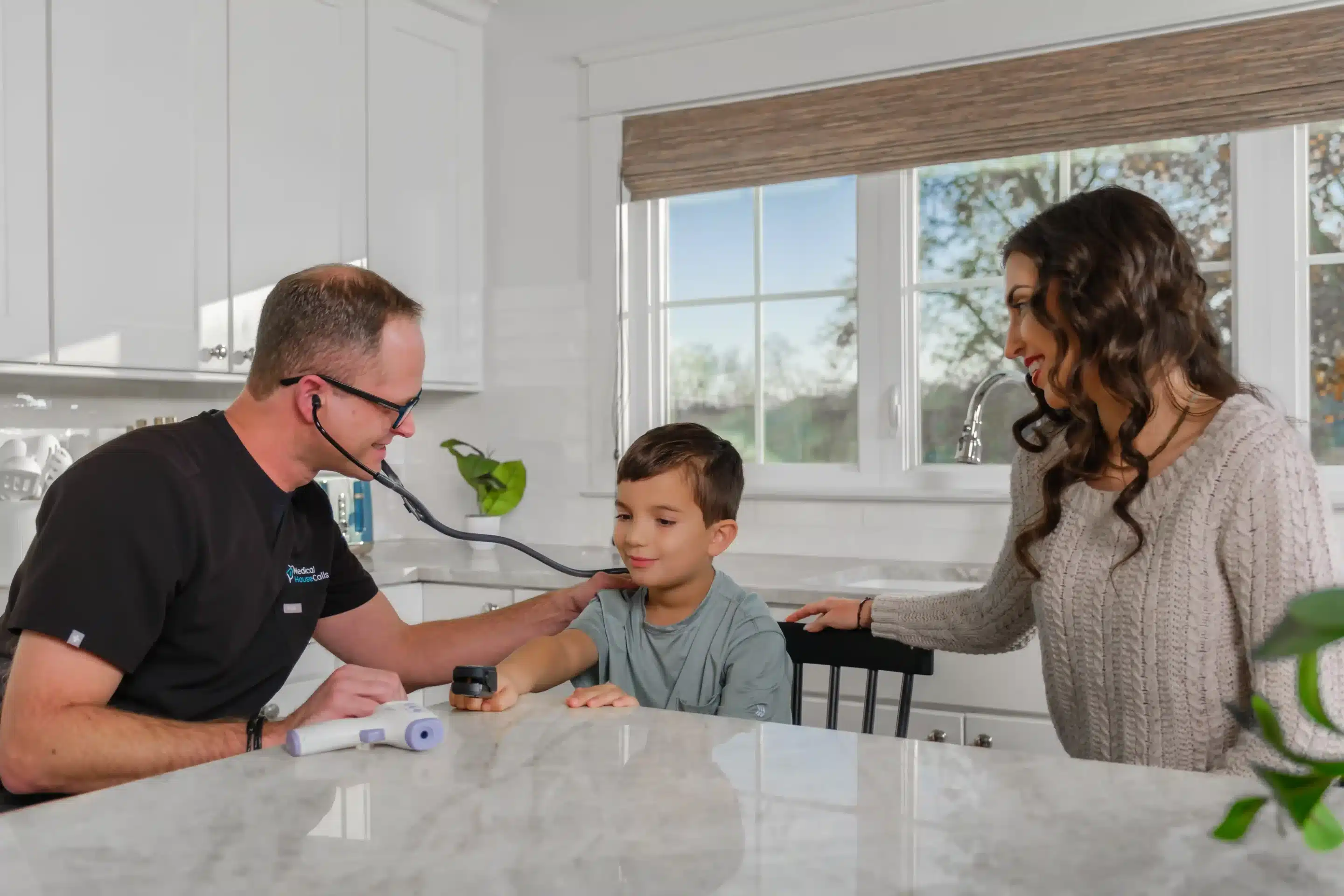
Concierge Primary Care At Your Doorstep
Experience primary care without leaving your home. Join our waitlist today and enjoy healthcare tailored to your needs–comfortably and conveniently.
Table of Contents
The Appeal Of Concierge Medicine: Why Doctors Choose This Path
Concierge medicine, a healthcare model where patients pay a membership fee for enhanced services and personalized care, has been gaining popularity. This departure from the traditional fee-for-service model prompts us to explore why so many doctors embrace concierge medicine services.
Beyond the financial considerations, several factors contribute to the appeal of this alternative healthcare approach. Continue reading below to find out the answer to: why are doctors going to concierge medicine?
Concierge Medicine Services
Membership-Based Access
In concierge medicine, patients pay a membership or retainer to gain access to a range of exclusive services. This fee structure often replaces or supplements traditional insurance payments, allowing for a more direct financial relationship between the patient and the healthcare provider.
Extended and Unhurried Appointments
A primary benefit of concierge medicine is the extended time doctors can spend with each patient. Appointments are less hurried, allowing for more in-depth discussions, comprehensive examinations, and personalized care plans. This focus on quality over quantity is a defining characteristic of concierge services.
Same-Day or Next-Day Appointments
Concierge practices often prioritize quick and easy access to medical care. Patients can typically schedule same-day or next-day appointments, reducing the wait time for medical attention. This prompt access is particularly valuable for addressing acute health concerns and fostering a proactive approach to healthcare.
Direct Communication with the Physician
Patients enrolled in concierge medicine programs often have direct and enhanced communication channels with their primary care physicians. This can include access to a dedicated phone line, email, or telemedicine, allowing for more direct communication.
Comprehensive Annual Health Assessments
Many concierge medicine practices offer assessments that go beyond an annual check-up. These often include in-depth screenings, advanced diagnostics, and wellness plans tailored to each patient’s needs and goals.
Preventive and Wellness Services
Circumvention is a focus of concierge medicine. Physicians in these practices often emphasize preventive measures, including lifestyle counseling, nutritional guidance, and personalized wellness programs. This aims to address health issues before they become more serious.
Coordination of Specialty Care
Concierge medicine providers implement care with specialists, ensuring a seamless experience for their patients. This can involve managing referrals, communicating with other healthcare professionals, and overseeing the overall continuity of care.
Health and Wellness Benefits
Some practices offer additional health and wellness benefits. This may include access to fitness programs, nutritional counseling, and other complementary services to promote well-being.
Benefits of Concierge Medicine for Doctors
Enhanced Doctor-Patient Relationships
One of the primary incentives for doctors in concierge medicine is the ability to develop stronger and more meaningful relationships with their patients. With a smaller patient panel, physicians can spend more time acquainting with each individual, understanding their medical history, and addressing their health concerns. This fosters trust and communication, leading to a more satisfying and fulfilling doctor-patient relationship.
Quality Over Quantity
In concierge medicine, physicians have a reduced patient load compared to traditional practices. This allows doctors to prioritize quality of care over quantity of patients seen. With more time for each appointment, physicians can conduct thorough examinations, delve into detailed medical histories, and tailor treatment plans. This emphasis on comprehensive care improves patient outcomes and a sense of professional fulfillment for doctors.
Reduced Administrative Burden
Traditional healthcare often involves extensive administrative tasks, including insurance paperwork, billing complexities, and regulatory compliance. Concierge medicine models often streamline these processes, allowing doctors to focus less on bureaucratic tasks. Reducing administrative burdens can increase job satisfaction and a better work-life balance for physicians.
Financial Stability
While financial considerations are not the sole motivation, concierge medicine can offer doctors a more predictable and stable income. The membership or retainer fees provide a steady source of revenue, reducing dependence on fee-for-service billing. This can alleviate the financial pressures of running a medical practice and allow physicians to invest more in delivering high-quality care.
Professional Autonomy
Doctors have more control over their practice, allowing them to make decisions based on their clinical judgment and the needs of their patient population. This autonomy extends to treatment modalities, appointment scheduling, and practice management. For many doctors, the ability to practice medicine in a way that aligns with their values and professional ideals is a significant motivator.
Benefits of Concierge Medicine for Patients
Purposeful Appointments
With a smaller patient panel, concierge doctors can afford to spend more time with each patient, conducting thorough examinations, addressing all concerns, and developing treatment plans. This approach leads to a more in-depth understanding of the patient’s health and contributes to a higher quality of care.
Prompt Access to Healthcare
Patients can schedule same-day or next-day appointments, reducing wait times and providing timely attention to health issues. This can be valuable for addressing acute conditions, managing chronic illnesses, and promoting proactive healthcare.
Enhanced Doctor-Patient Relationships
Patients often appreciate having a healthcare provider who knows them, understands their medical history, and can provide advice based on individual health goals. The improved communication and trust in the doctor-patient relationship contribute to a more satisfying healthcare experience.
Comprehensive Preventive Care
Physicians often go beyond standard check-ups, offering annual health assessments, wellness plans, and proactive health screenings. This can lead to the early detection of potential health issues, contributing to better long-term patient outcomes.
Convenience and Additional Services
Patients enrolled in concierge medicine often have privileges such as direct communication with their provider through dedicated phone lines or email. Some concierge practices also offer telemedicine. Certain concierge models may also provide fitness programs and nutritional counseling, enhancing the healthcare experience.

Increasing Patient Demands and Expectations
With the concierge model promising extended appointment times and quicker access to medical care, patients expect a level of attention beyond the conventional healthcare system. Moreover, there is an increasing demand for proactive and preventive healthcare measures, with patients seeking treatment for existing conditions and a focus on wellness and disease prevention.
The emphasis on building strong doctor-patient relationships in concierge practices has led to an expectation of more direct and frequent communication. As concierge medicine continues to evolve, the growing demands and expectations are likely to shape the development of this healthcare model, influencing how services are structured and delivered to meet the evolving needs of an engaged and discerning patient population.
Challenges Faced by Traditional Medical Practices
The adoption of concierge medicine has introduced a transformative shift in the healthcare landscape, and in doing so, it has accentuated the challenges. One hurdle lies in the financial models. Traditional practices, reliant on insurance reimbursements and volume-based patient visits, often struggle to compete with the financial stability of concierge medicine’s membership-based approach. This economic divide challenges traditional practices in retaining quality healthcare providers and maintaining the same level of care.
Furthermore, the transition to concierge medicine highlights the strain on the doctor-patient relationship within traditional practices. The time constraints imposed by larger patient loads and administrative burdens make it difficult for physicians to provide individualized attention. The emphasis on preventive care and wellness plans, hallmarks of concierge medicine, often takes a backseat in traditional settings where the focus is more on reactive care.
As patient expectations evolve in favor of a more personalized and proactive healthcare approach, traditional medical practices grapple with balancing the demands while navigating the limitations imposed by traditional models.
Financial Considerations
Membership Fees
Patients pay an annual fee or retainer to access the concierge practice’s services. It’s essential for individuals to evaluate their budget and assess whether the membership fee aligns with their fiscal capabilities.
Insurance Coverage
Concierge medicine often operates outside the insurance model for primary care services. However, patients must maintain health insurance for specialty care, hospitalizations, and other services. Patients should be aware of their coverage and understand how it complements the services offered by the concierge practice.
Out-of-Pocket Costs
In addition to the membership fee, patients may incur out-of-pocket costs. These could include prescription medications, laboratory tests, and referrals to specialists. Understanding the membership fee’s scope and potential additional costs is crucial.
Comparative Value Analysis
Individuals should weigh the benefits of personalized care, extended appointment times, and enhanced preventive services against the costs. A comparative analysis can determine whether the additional expense aligns with healthcare priorities and preferences.
Healthcare Flexibility
Though concierge medicine offers convenience, individuals should evaluate whether the financial commitment aligns with their healthcare preferences and whether the model accommodates their medical needs. Flexibility in healthcare decisions is essential, and patients should ensure that the financial commitment is justified by the level of service and convenience provided.
Future Trends in Concierge Medicine
The future of concierge medicine is poised to witness transformative trends that respond to evolving patient needs and advancements in healthcare technologies. One prominent trend is the integration of digital health solutions.
Telemedicine is anticipated to be central in providing convenient access to healthcare services from anywhere. Moreover, wearable devices and health apps will become commonplace, enabling continuous monitoring and real-time data collection for proactive care. Incorporating these technologies aims to enhance the patient experience, offering greater accessibility, improved health management, and streamlined communication between patients and their concierge healthcare providers.
Another significant trend is the expanding focus on preventive care and wellness. Concierge medicine is anticipated to prioritize comprehensive wellness programs, genetic testing, and advanced screenings. This shift aligns with the model’s emphasis on proactive healthcare, aiming to identify and address health risks.
Furthermore, there may be a broader adoption of hybrid models with tiered memberships. The evolving landscape suggests a future where patients benefit from an individualized, technology-driven, and holistic approach to their well-being.
Emerging Technologies and Telemedicine in Concierge Medicine
- Telehealth Consultations: Telemedicine platforms allow concierge physicians to conduct remote consultations, providing patients convenient access to healthcare from the comfort of their homes. This is beneficial for check-ups, follow-ups, and minor health concerns, reducing the need for in-person visits.
- Health Monitoring Devices: Wearable devices and at-home health monitoring tools are becoming integral to concierge medicine. Patients can use devices to track vital signs, monitor chronic conditions, and collect health data. This real-time information enables physicians to manage and adjust treatment plans, fostering a dynamic and preventive approach to healthcare.
- Electronic Health Records (EHRs): The adoption of electronic health records is streamlining administrative processes. EHRs facilitate secure and efficient patient information sharing, improving provider communication and ensuring that a patient’s medical history is accessible, even during virtual consultations.
- Mobile Apps for Patient Engagement: Concierge practices are developing mobile applications that enable patients to schedule appointments, access their health records, receive health tips, and communicate with their healthcare providers. These apps enhance patient engagement and empower individuals to take an active role in managing their health.
- Artificial Intelligence (AI) in Diagnostics: AI technologies are being employed to analyze large datasets, aiding in detecting and diagnosing medical conditions. In concierge medicine, AI can interpret complex medical information, allowing for faster and more accurate diagnoses, which aligns with the model’s emphasis on proactive healthcare.
- Secure Communication Platforms: Concierge practices invest in secure communication platforms to ensure privacy and security in virtual interactions. These platforms enable confidential communication, support the exchange of sensitive information, and maintain the high standards of privacy associated with concierge medicine.
Why Are Doctors Going to Concierge Medicine?
The rise of concierge medicine services reflects a paradigm shift in healthcare. The benefits are evident, from strengthened doctor-patient relationships to enhanced preventive care. As individuals seek a higher standard of medical attention, concierge medicine stands out as a model.
Sign Up for Concierge Medicine with Medical House Calls
For those ready to experience the advantages firsthand, we invite you to explore the custom services offered by Medical House Calls. Choose from one of out three plan options to enjoy 12 months of unlimited medical house calls and telehealth consultations for just you or up to to four family members, all with no service fee per visit.
Take the first step to a more comprehensive and accessible healthcare experience—contact us today to learn more and embark on a journey toward optimal health and wellness.
Family & Individual Care Available
Enjoy personalized primary care customized for families and individuals, delivered conveniently at home. Discover flexible plans designed to keep everyone healthy and thriving.















